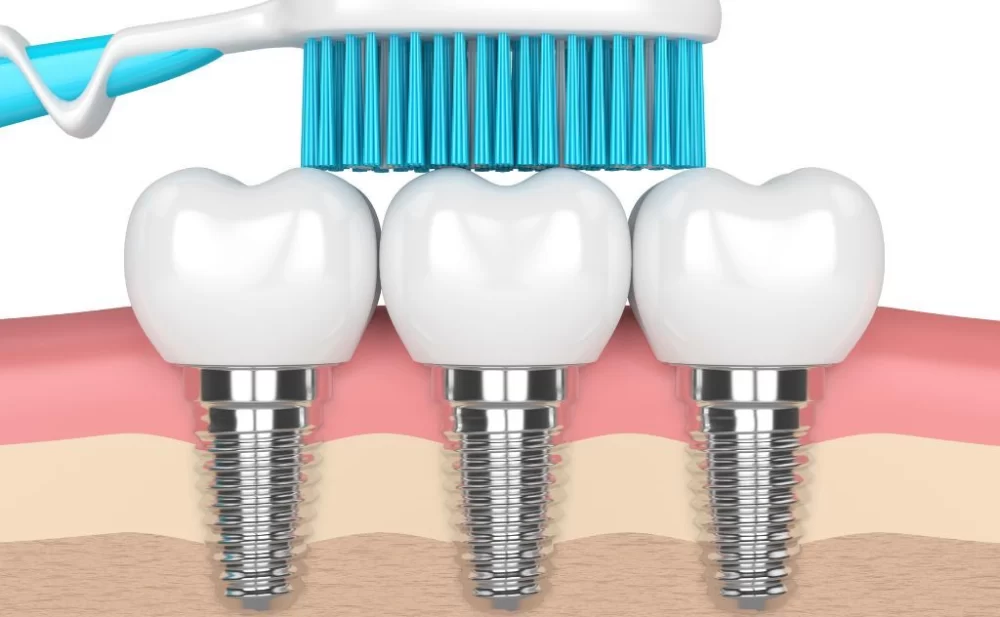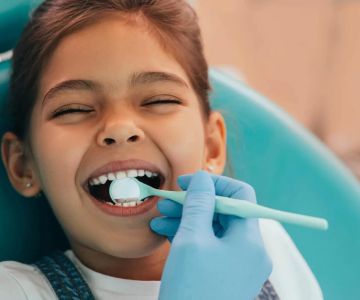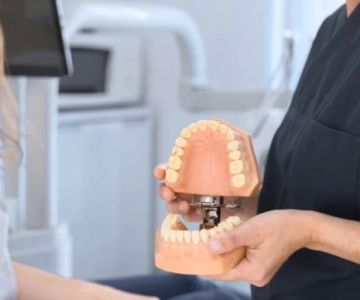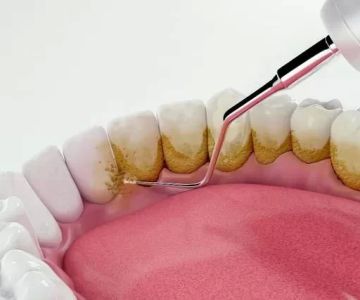
- Importance-of-Cleaning-Dental-Implants
- Step-by-Step-Guide-to-Clean-Dental-Implants
- Common-Mistakes-and-How-to-Avoid-Them
- Professional-Care-and-When-to-See-a-Dentist
- Real-Life-Experience-with-Implant-Care
1. Why Cleaning Dental Implants Is Crucial for Preventing Infection
Dental implants have revolutionized tooth replacement, providing durability and a natural look. However, maintaining them properly is essential to avoid infection, which can lead to implant failure. Unlike natural teeth, implants don’t have the same natural defense mechanisms, so biofilm buildup and bacteria accumulation around the implant can cause peri-implantitis, an inflammatory condition similar to gum disease.
Understanding how to clean dental implants to avoid infection involves appreciating the delicate balance between oral hygiene and implant care. Regular cleaning is not just about aesthetic appeal but a critical health necessity to prevent complications that can cause discomfort, bone loss, and even implant removal.
Furthermore, patients often underestimate the importance of implant care, assuming implants do not require as much attention as natural teeth. This misconception leads to neglect and higher risk of infections. Good hygiene habits specifically adapted to implants can ensure their longevity and the overall health of your mouth.
1.1 The Role of Oral Hygiene in Implant Longevity
Oral hygiene for implants extends beyond brushing. It involves a multi-faceted approach including flossing, rinsing, and sometimes using specialized tools to clean around the implant fixtures. Poor hygiene results in plaque buildup, which acts as a breeding ground for harmful bacteria that can infect the gums and the bone supporting the implant.
Maintaining the right cleaning routine keeps the tissues healthy and supports the integration of the implant with the jawbone, a process known as osseointegration. Failure to do so can jeopardize this integration, risking implant failure.
2. Step-by-Step Guide to Cleaning Dental Implants Effectively
Cleaning dental implants requires careful technique and appropriate tools. Here is a detailed guide to help you maintain impeccable hygiene and avoid infection:
2.1 Daily Brushing with the Right Tools
Use a soft-bristle toothbrush or an electric toothbrush designed for dental implants. Brush at least twice daily, focusing on the gum line and implant surface. Avoid hard-bristle brushes or abrasive toothpaste that can scratch the implant’s surface, making it prone to bacterial attachment.
2.2 Flossing and Interdental Cleaning
Regular flossing around implants removes debris and plaque from areas where a toothbrush can’t reach. Special implant floss or interdental brushes with soft bristles are recommended to gently clean around the implant post without damaging the gum tissue.
2.3 Use of Antimicrobial Mouth Rinses
Rinsing with an antimicrobial mouthwash helps reduce bacterial load. Chlorhexidine-based rinses are often prescribed by dentists for implant care, especially in the initial healing period after implant surgery.
2.4 Professional-Grade Tools for Home Use
Water flossers or oral irrigators can be highly effective in flushing out bacteria from under the gumline around implants. These devices use a stream of water to clean areas that are difficult to access, reducing the risk of infection.
2.5 Routine Inspection and Monitoring
Regular self-checks for redness, swelling, or bleeding around implants are important signs that might indicate early infection. Prompt action and consultation with a dental professional can prevent complications.
3. Common Mistakes in Implant Care and How to Prevent Infection
Many patients inadvertently damage their implants or increase infection risk by following incorrect cleaning habits. Here are common pitfalls to avoid:
3.1 Over-Brushing or Using Harsh Products
Vigorous brushing or abrasive toothpaste can erode implant surfaces or irritate surrounding gums. This damage compromises the implant’s protective barrier and invites infection.
3.2 Neglecting Professional Cleanings
Relying solely on home care without professional dental cleanings leads to plaque and tartar buildup in hard-to-reach areas. Professional tools can remove these deposits safely and maintain implant health.
3.3 Ignoring Early Symptoms of Infection
Discomfort, swelling, or bleeding are often ignored until the condition worsens. Early intervention can save the implant from infection or failure. Educating yourself about signs to watch for is key to timely treatment.
4. Professional Care: When and Why to Consult Your Dentist
Even with meticulous daily cleaning, professional dental check-ups and cleanings are essential to keep implants healthy. Dentists use special instruments that won’t harm the implant surface to remove hardened deposits.
Regular visits every 3 to 6 months allow early detection of peri-implant disease, assessment of implant stability, and maintenance of surrounding tissue health. Your dentist may recommend tailored cleaning protocols or prescribe antimicrobial treatments if infection risk is high.
Visiting Dentistry Toothtruth can help you access expert advice, quality cleaning products, and professional care services tailored for implant maintenance, ensuring your smile stays healthy and infection-free.
5. Real-Life Experience: How Proper Cleaning Saved My Dental Implant
John, a 52-year-old patient, shared his story of struggling with inflammation around his dental implant after neglecting cleaning for months. Initially dismissing mild discomfort, he later developed swelling and sensitivity.
After visiting his dentist, John was educated on how to clean dental implants to avoid infection and received a professional cleaning. By following a detailed home care routine and scheduling regular professional visits, his gum health improved dramatically, preventing implant loss.
John’s experience highlights the importance of consistent care and proactive hygiene measures. Stories like his emphasize that dental implants, while durable, require dedicated maintenance to last a lifetime.
For those seeking the best dental implant care products and professional support, Dentistry Toothtruth offers a range of specialized solutions to meet your needs. Proper cleaning and professional guidance are the best defenses against infection and implant complications.







 Westgate Dental Arts
Westgate Dental Arts Coventry Family Dental
Coventry Family Dental Familia Dental
Familia Dental Dr. Daniel S. Fife, DDS
Dr. Daniel S. Fife, DDS Dentistry At Suburban Square: Michael I. Wollock, DMD
Dentistry At Suburban Square: Michael I. Wollock, DMD Comfort Care Dental
Comfort Care Dental The Importance of Oral Health Education During Pregnancy for a Healthy Pregnancy
The Importance of Oral Health Education During Pregnancy for a Healthy Pregnancy Why Skipping Dental Checkups Can Lead to Bigger Oral Health Problems
Why Skipping Dental Checkups Can Lead to Bigger Oral Health Problems Advantages of Porcelain Dental Restorations
Advantages of Porcelain Dental Restorations Best Tips for Brushing Your Teeth Properly for Healthy Gums: Essential Techniques for Oral Health
Best Tips for Brushing Your Teeth Properly for Healthy Gums: Essential Techniques for Oral Health How Can Diabetes Cause Tooth and Gum Problems? Preventing and Managing Oral Health Issues
How Can Diabetes Cause Tooth and Gum Problems? Preventing and Managing Oral Health Issues Healthy Habits for Promoting Good Oral Health and Hygiene: Tips for a Healthy Smile
Healthy Habits for Promoting Good Oral Health and Hygiene: Tips for a Healthy Smile